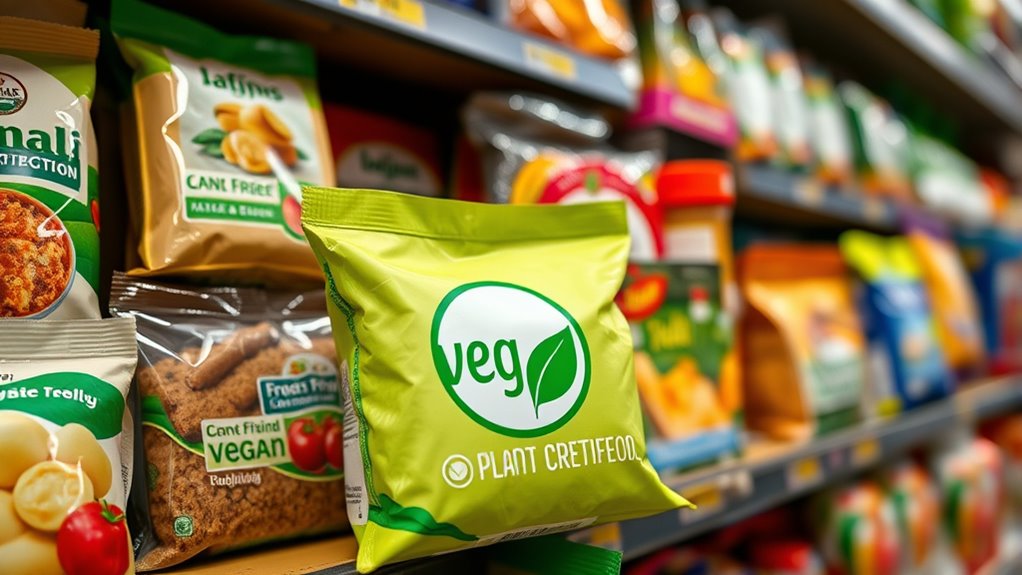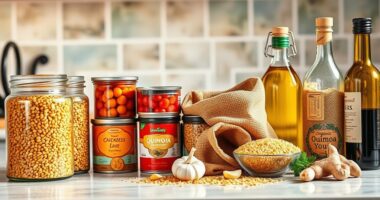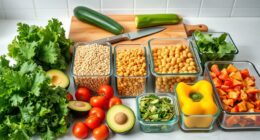Vegan certifications help you identify products that meet strict standards, confirming they contain no animal ingredients and aren’t tested on animals. Look for trusted third-party seals, as they verify that manufacturers follow ethical guidelines. Not all labels are equal, so understanding certification standards guarantees you’re choosing genuinely vegan options. To make confident choices aligned with your values, it’s important to know what these labels mean—keep exploring to learn more.
Key Takeaways
- Vegan certifications are verified by third-party organizations that assess ingredients, manufacturing, and testing practices to ensure no animal involvement.
- Not all vegan labels are equally reliable; certified labels provide more trustworthy proof of compliance with strict standards.
- Certification standards typically prohibit animal-derived ingredients like beeswax, shellac, or carmine and confirm no animal testing occurs.
- Non-certified labels may be vague or misleading, making it harder to confirm if a product is genuinely vegan.
- Consumers should look for recognized certification seals and understand their standards to make informed, ethical purchasing decisions.

Have you ever wondered what it really means when a product is labeled as “vegan”? It’s more than just a marketing term; it signifies that the product contains no animal ingredients and hasn’t been tested on animals. However, not all vegan labels are created equal, so understanding what these labels imply is essential if you’re committed to a plant-based lifestyle. Many products feature plant-based labels, which often suggest the product is free from animal derivatives, but these labels can sometimes be misleading or vary in strictness depending on the certification process behind them. When you see a vegan label, it’s worth checking whether it’s backed by a trusted certification process or just a marketing claim. Certification processes involve a third-party organization verifying that the product genuinely meets specific standards for veganism. These organizations review ingredients, manufacturing practices, and testing procedures to ensure there’s no animal involvement at any stage. This process provides an extra layer of confidence because it’s not just the manufacturer’s word — an independent body has validated the claim.
Understanding these certification processes is critical because, without them, labels can sometimes be vague or inconsistent. Some brands might label their products as vegan to appeal to a growing market segment, but without proper certification, they might still use animal-derived ingredients or testing methods. Certified vegan products, on the other hand, adhere to strict guidelines established by reputable organizations. These guidelines typically require that no animal products are used, no animal testing occurs during production, and that the ingredients are free from animal derivatives like beeswax, shellac, or carmine. When you see a product with a vegan certification, you can be reasonably confident that it aligns with your values, provided the certifying body is reputable. Additionally, understanding certification standards can help you recognize which labels are trustworthy and which may be more superficial.
In essence, not every plant-based label guarantees a product is fully vegan, so it’s wise to look for certification seals from recognized organizations. These seals serve as proof that the product has undergone a thorough review process and meets established vegan standards. This clarity helps you make informed decisions, ensuring you’re supporting products that align with your ethical and dietary choices. So, next time you’re shopping for vegan products, take a moment to examine the labels and certifications. Knowing what to look for empowers you to choose genuinely vegan options and avoid any unintentional compromises on your values.
Frequently Asked Questions
How Do Vegan Certifications Vary Internationally?
You’ll notice vegan certifications vary internationally due to cross border certification differences and regional label distinctions. Some countries have strict standards, like the UK’s Vegan Society, while others may lack formal certification, relying on local labels. This means you need to check each label carefully, understanding regional standards and recognizing that a vegan label in one country might not meet another’s criteria, so always stay informed when shopping abroad.
Are There Any Legal Standards for Vegan Labeling?
You’ll find that legal standards for vegan labeling are limited, which can lead to vegan ingredient verification and label authenticity concerns. While some countries have regulations requiring truthful claims, many lack strict rules, making it essential to scrutinize labels carefully. Coincidentally, this variability means you should look for reputable certifications, understand local laws, and trust verified labels to guarantee a product truly aligns with your vegan standards.
Can a Product Be Vegan Without Certification?
Yes, a product can be vegan without certification if it clearly makes plant-based claims and uses vegan ingredient sourcing. You should look for labels that specify “vegan” or “plant-based,” but always verify the ingredient list to confirm no animal-derived ingredients are included. Keep in mind that uncertified vegan products rely on transparent sourcing and honest marketing, so your diligence helps verify they meet your ethical and dietary standards.
What Are Common Misconceptions About Vegan Labels?
You might think all vegan labels guarantee complete honesty, but misconceptions about vegan labels are common. Mislabeling risks exist, meaning some products labeled vegan may still contain animal-derived ingredients or cross-contamination. As a consumer, you should be cautious, because false labels can erode trust. Always check for credible certifications and read ingredient lists carefully to guarantee the product truly aligns with your vegan standards.
How Often Are Vegan Certification Standards Updated?
Vegan certification standards evolve like a river carving new paths, and updates happen periodically to keep the flow clear. Certification processes are reviewed annually or biannually, ensuring label accuracy and reflecting current practices. While some standards stay steady, others shift as new ingredients or ethical considerations emerge. Staying informed means watching for these updates, so you can trust that vegan labels truly represent the commitment they claim to uphold.
Conclusion
By understanding vegan certifications, you can confidently make ethical choices and support brands that align with your values. Did you know that the plant-based food market is expected to grow by over 11% annually through 2027? That’s a clear sign more people are prioritizing compassionate, sustainable options. So, next time you shop, look for trusted labels—your choices not only impact animals and the planet but also shape a kinder, more sustainable future.









